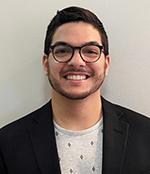Focusing on the ‘Why’
Nicolas Vivas realized customers needed to be the focus when it comes to developing new products. He learned how to make that happen thanks to mpd².
Nicolas Vivas (mpd² '22) was early in a promising career as a mechanical engineer when he realized something about the product discussions he kept overhearing.
The people involved in developing those products weren’t asking the right question, he thought.
 “My biggest frustration was that all the problem-solving discussions I heard were focused on the ‘how’ we were going to do something," Vivas said, "but never the ‘why.'"
“My biggest frustration was that all the problem-solving discussions I heard were focused on the ‘how’ we were going to do something," Vivas said, "but never the ‘why.'"
Vivas wanted to change that. Instead of worrying about the steps needed to develop a product, he wanted to help facilitate a conversation about what pain point the product was solving. He hoped the end user would be the focus when making all product decisions.
To make that happen, he turned to Northwestern Engineering's Master of Product Design and Development Management (mpd²) program.
“mpd² puts the ‘why’ in the center of everything,” said Vivas, an associate product manager at Capital One. “That mental shift was really appealing to me, and I felt like it was where I needed to go next in my career.”
Vivas was a senior mechanical design engineer at Boeing when he started the mpd² program. His experience in the program directly influenced his work on Boeing’s Commercial Crew Starliner and brought him in contact with the astronauts who soon will blast off for the International Space Station.
mpd²’s emphasis on human-centered design helped guide his approach to the task.
“The lessons I learned applied directly to my work with the astronauts,” he said. “I knew I had to ask them as many questions as I could to best understand what their needs were and subsequently ensure we were solving that.”
Vivas said the most important lessons he took away from his time in the mpd² program were the human-centered approach to product development and the need to collaborate with others to turn good work into great work.
“The success of your product 100-percent depends on the relationship you have with your team,” he said. “In mpd², that is certainly one of the toughest yet most rewarding challenges.”
Vivas graduated from the mpd² program in June. By the end of September, he was starting his own new journey at Capital One, an opportunity he said would not have emerged without his experiences in mpd².
“I owe the transition completely to mpd²,” he said. “It exposed me to the role of product management, which I didn't know about before. The capstone project allowed me to develop a product outside of my usual area of expertise.”
Now, Vivas applies the mpd² lessons in a technical product management role, working to develop automation solutions to minimize cloud security risks. He said he finds the work meaningful because of its importance.
“I love solving authentic problems,” he said. “Seeing that my work is truly desirable is a huge motivator for me.”
Because of his own experiences, Vivas has become a strong advocate of the mpd² program for those looking for a career boost like he was.
His advice? Learn from your classmates as much as you do from your professors and use the capstone as an opportunity to push yourself toward learning something new.
“If you are in software, learn to use the machine shop," he said. "If you are in engineering, volunteer to make the business model. mpd² is a fantastic program for those seeking to add creativity, innovation, and empathy to their careers.”
